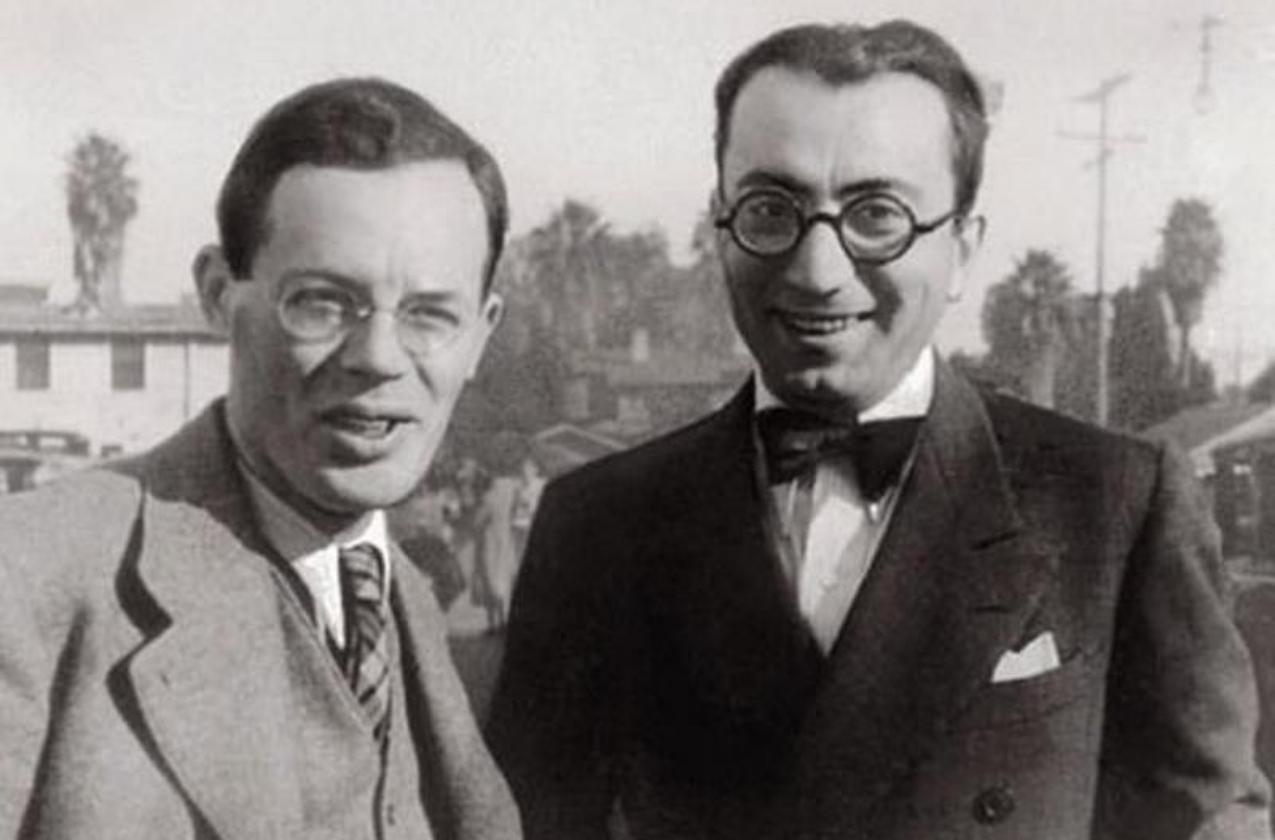These were the first Soviet journalists to travel by car from the Atlantic to the Pacific coasts of the United States, revealing Great Depression-era America to millions of readers in the USSR. Praised and criticized, but dubbed an ingenious duo, both by many of their contemporaries and descendants, they also created one of the most popular series of comic novels in Soviet literature. They were published, republished, staged, filmed and refilmed again and again. Like many talents, the brilliant literary tandem also received their share of bitterness.
The tandem
Ilya Ilf, real name Iyekhel-Leyb Finezilberg, was born on October 4, 1897, to a Jewish family in the Black Sea city of Odessa (Ukraine, The Russian Empire). After graduating from high school he first tried many professions, working at a design bureau, a telephone station and even an arms factory, before finally finding his talent in writing. It’s well worth mentioning that since the end of the 19th century Odessa itself had become quite an artistic place. Many famous writers, musicians and creative people in general were either born there or at least spent a couple of years of their lives in this city, including Pushkin, Gogol and Paustovsky, Chukovsky and Kandinsky – and the list goes on. Its ethnically-diverse population, which includes Ukrainians, Russians and Jews, and its geographical location (Odessa is Ukraine’s largest port on the Black Sea) have affected local culture and language. Although it still sounds like Russian, there’s a special dialect which was born under the influence of Yiddish and even Western European tongues. All of this led to the creation of a separate “Odessian†language, very colorful and, especially, humorous – which couldn’t have but affected Ilf’s writing style.


In 1923, he moved to Moscow and found a job as a journalist in the state-run newspaper Gudok (Signal) which featured in news and feature stories about the Soviet railway industry. His pen name originates from the first letters of his first name and the first letter of his family name. However, it's generally assumed the name Ilya was actually given to him by his parents, who had a tradition of giving second, Russian, names to their children.
Evgeny Petrov, real name Evgeny Katayev, was born in 1903, also in Odessa. After graduating from high school, he worked as a criminal investigator for three years. Later some of his friends joked that Petrov's first literary creation was the protocol description of a dead body. After quitting the force he worked as a correspondent at a Ukrainian telegraph news agency, but soon moved to Moscow and also found a job at Gudok. Both Ilf and Petrov were quite interested in comedy, Gudok is where they met and the legendary duo was born.

The Twelve Chairs and The Little Golden Calf
A series of comic novels with the plot based around Ostap Bender, a conman in search of an elusively rich life in the Soviet Union in the 1920s, using clever schemes to trick the system. It’s thought Bender’s character was created partially basing on real people whom Petrov came across during his time working as a criminal investigator. A mix of their real qualities sprinkled with a pinch of that famous Odessian humor put together an ingenious literary character.
Written and set in the relatively liberal period of the Soviet history, the time of the so-called New Economic Policy, the novels presented unseen-before humorous criticism of Soviet reality of those days. The two books have cemented their place among the most widely-read and quoted in Russian literature. Many of Bender's phrases have long become pearls of national folklore and are still on the lips of many fans. The lead character was played by several Soviet movie stars during various remakes, with some of their fans still quarreling over which was the most successful.
After the end of the New Economic Policy, times changed and Ilf and Petrov were accused of anti-Soviet propaganda. Despite their massive popularity both novels were republished only after the death of Joseph Stalin. But this did not stop Ostap Bender from becoming the most beloved conman of all times, as many critics still agree.
One-storeyed America (Little Golden America)
Little Golden America is the journalistic masterpiece of Ilf and Petrov. At the end of 1935 the duo managed to go on an unprecedented tour of the USA and reported the entire trip to the Soviet audience in a book published in 1937. Backed by hundreds of pictures taken by Ilf and published in a photo essay entitled "American Photographs", millions of people in the USSR got a unique first glimpse not only at mountain-high skyscrapers, but the heartland of the US - "the one-storeyed America".

Photo by Ilya Ilf . Russian State Archives of Literature and Art
Shortly after arriving in the States, Ilf and Petrov met with an American married couple from New York (the Adams family) who became their tour guides. The four of them purchased a brand new Ford and in two months drove through the entire country, visiting and reporting about New York, Chicago, Kansas, Oklahoma, Las Vegas, San Francisco, Los Angeles, San Diego, El Paso, San Antonio, New Orleans and the capital - Washington D.C. The duo tried to cover as many stories as possible, describing ordinary life in the US in every detail, revealing to the wide Soviet audience many new names, including Hemingway, Ford, Morgan, Twain, Edison, Williams, Reed and more.

Photo taken by Evgeny Petrov. Russian State Archives of Literature and Art
For the first time millions of Soviet readers were presented with stories and photos of native Americans, Mexican villages, Russian immigrants, as well as never before seen or heard about sports in the USSR like the rodeo, wrestling, American football and the Mexican corrida. Imagine the affect caused by photos from the top of the Empire State Building - the world's tallest building at the time! Or conversely, reports and pictures of a system of caves in New Mexico, deep bellow the surface? The duo described one of the most controversial American inventions - the electric chair - visited the White House and even met with President Roosevelt.
Of course, the powerhouse of American cinematography, Hollywood, wasn't left without their attention as well. The readers were astonished! Shortly after coming out in the Soviet Union, Charles Malamuth translated the book into English entitled "Little Golden America" and it was published in the States.
"One Half of a Genius"
Shortly after returning from the USA, Ilya Ilf died of tuberculosis. It was so quick and unexpected that the entire Soviet Union was shocked by the tragic loss. Hundreds of Ilf's sketch books and diaries, breathing with that unique writing style, still remind of his talent. Unfortunately, Petrov alone wasn't able to produce anything on a similar level as when they created together. He died in a plane crash in 1942 while covering the Eastern Front during WWII, deemed by many critics as only "One Half of a Genius".






















